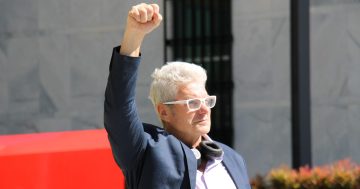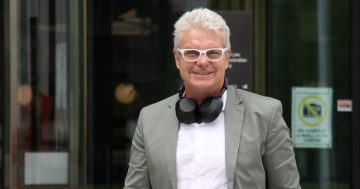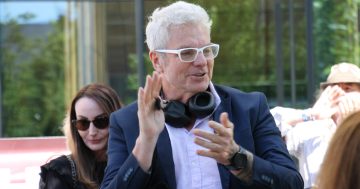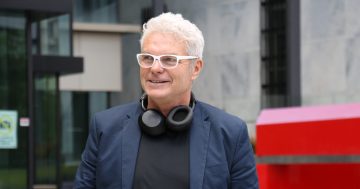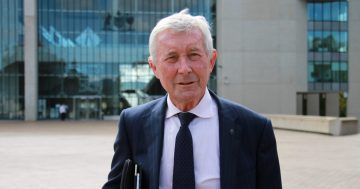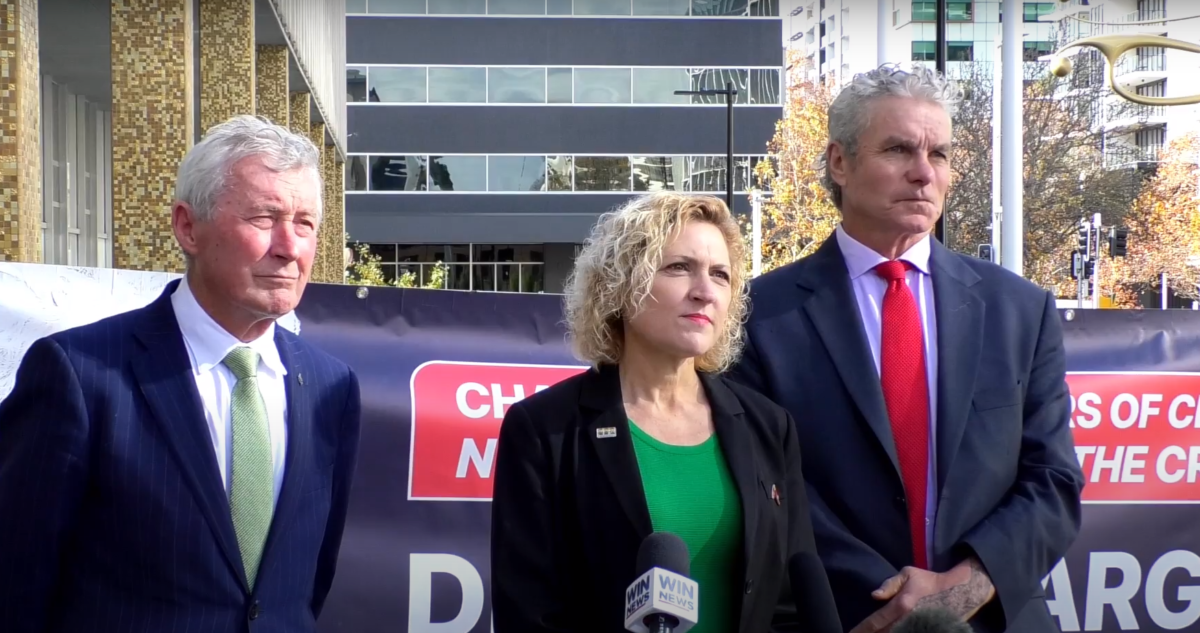
ACT Veterans Minister Emma Davidson (centre) was joined by Bernard Collaery (left) in calling for the Federal Attorney-General to drop charges against whistleblower David McBride. Photo: Supplied.
The ACT’s minister for veterans and mental health has added her voice to the calls for Federal Attorney-General Mark Dreyfus to drop the charges against whistleblower David McBride.
Mr McBride was charged with three breaches of the Defence Act in 2018 after allegedly giving information about possible war crimes to the ABC, which have become known as the Afghan Files.
ACT MLA Emma Davidson said in the wake of decorated former SAS soldier Ben Roberts-Smith’s defamation claims being dismissed – with a Federal Court finding implications of murder, violence, bullying and domestic violence by him were largely proven – now was the time for charges against Mr McBride to be dropped.
“This prosecution is not in the public interest, both for the impact on Australian foreign relations and for the impact on veterans and their families,” she said.
She explained that when the Afghan Files first became public, it was a “distressing time” for those who had served in accordance with the rules of engagement, particularly in the Middle East.
She further said when the Bereton Report into the files came out, this again deepened “moral injury” and reopened old wounds.
Ms Davidson argued that pursuing the case against Mr McBride would do the same thing once more.
“I know, having worked with a lot of veterans myself, that honour and justice are really important to them, and so are rules of engagement,” she said.
“Continuing with this prosecution is not in the public interest.”
She said the legal costs of the Commonwealth in fighting this case had already totalled more than $1.8 million (as of February 2023), and she felt this money could be better spent.
“I’d really like to see us investing in and prioritising mental health programs that can support veterans, particularly veterans who have served in places like Afghanistan,” Ms Davidson said.
Her calls were backed by a familiar face in the whistleblower space, Canberra lawyer Bernard Collaery.
The Federal Attorney-General dropped five secrecy charges against Mr Collaery in 2022, and now he wants to see the same thing done for Mr McBride.
He backed Ms Davidson’s argument that pursuing charges against Mr McBride would bring more harm than good.
“A lengthy trial of this good man, David McBride, will open wounds all over our nation,” Mr Collaery said.
“It will reopen the questions posed to Australia by our allies and reopen concerns we have for the morale in our defence forces.”
Human Rights Law Centre senior lawyer Kieran Pender also highlighted the parallels with the Ben Roberts-Smith case.
He said Mr McBride was a whistleblower, not a war criminal, yet he would be the first person on trial over Australia’s alleged war crimes in Afghanistan.
“Recent events in the Ben Roberts-Smith case have only underscored the injustice of the continuing prosecution of McBride, who bravely spoke up about alleged war crimes,” Mr Pender said.
“Anthony Albanese and Mark Dreyfus KC cannot remain idle while this unjust case drags on.
“The case must be stopped now and whistleblowing laws reformed so this can never happen again.”
Mr McBride withdrew his bid to use the Public Interest Act in a civil proceeding to clear his name in October last year to take his fight to a jury.
His trial date has been set for 13 November later this year.
He said while he was used to the stress after 10 years of waiting, he worried about how his case would impact other people looking to speak up about wrongdoings.
“What does it look like for people who are thinking of becoming whistleblowers to look at my case and think, ’10 years, am I really going to do it?'” Mr McBride asked.
“All I have done is done my job, and they are trying to put me in jail for doing my job.”
He lamented that he could be imprisoned before any charges may be laid against soldiers accused of committing war crimes.
“My theory is [the Commonwealth] cares more about secrets than they care about crimes,” Mr McBride said.
“The fact that the government cares more about putting me in jail … says we are in a very sick place in Australia where secrets and hiding the truth are more important than the law.”
He argued national security was no excuse for covering up crimes, and while it might not set a good precedent for the Federal Attorney-General to drop charges, it also wasn’t a good precedent to make an example of him.
“[Mark Dreyfus] is going to look a bit stupid if I’m in jail and Ben Roberts-Smith’s in Hollywood talking about his life story,” Mr McBride said.
“What does that say about justice in Australia?”












